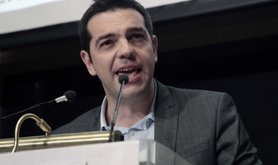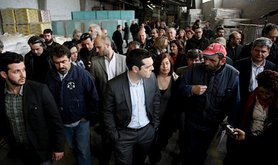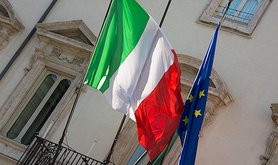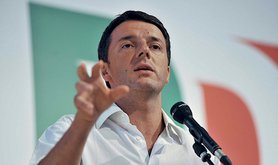
In Palermo, Sicily. Demotix/Antonio Melita. All rights reserved.
The European elections invoke bad memories for Italy's radical left supporters. They are largely used to political defeat; but the last vote for the EU Parliament, in 2009, was particularly frustrating. In spite of the recent approval of a 4 percent electoral threshold, the parties belonging to this side of the political spectrum didn’t manage to form a compact front. What happened next wasn't hard to foresee. Two separate lists scored respectively 3.1 and 3.4 percent, failing to win any seats at all.
Five years later, the 4 percent threshold keeps haunting the radical left – alongside all the other small parties that still animate Italy's fragmented political system.
This time, the radical left has gathered around a common political project: a new-born movement called “The Other Europe with Tsipras” – which supports the rising star of the Greek left, Alexis Tsipras, for the European Commission presidency.
The list’s manifesto contains a series of radical, well-argued criticisms of austerity as the European recipe against the economic crisis. Among the main proposals are the cancellation of the Fiscal Compact and the modification of the Maastricht treaty, in order to relax the member states' obligations on debt and deficit control; a new focus on unemployment as the top issue to be addressed by the EU's economic policies; more state intervention in the economy, with the implementation of a sort of New Deal to create jobs; the introduction of jointly-issued Eurobonds.
This programme accords with the feelings of a large part of the Italian public. Nonetheless, The Other Europe is having a hard time winning over the country's voters. In recent polls, its support rarely goes beyond 3.5 percent: not enough to enter the Parliament.
When the movement was born, at the beginning of the year, its future seemed much brighter than this. In the February polls, support rates were as high as 7 percent. In only one month, the list collected some 220,000 signatures, many more than what was needed to participate in the elections. But in the past weeks campaigning has grown louder, and this new voice can now hardly be heard.
Such difficulties have many explanations. The list was created on the initiative of a group of highly esteemed intellectuals, including sociologist Luciano Gallino and journalist Barbara Spinelli; but it lacks a popular figure able to appeal to the larger public, to which these names are far from familiar.
In an age of increasing personalisation of politics, the campaigns for the European Parliament have also become more and more focused on national party leaders. And this time around, Italy's “historic” populist, Silvio Berlusconi – weakened but still astoundingly popular – is not the only politician able to connect with the electorate: he is confronted by Beppe Grillo, with his violently anti-political rhetoric, and by PM Matteo Renzi's personal charisma and media savoir-faire.
A foreign politician such as Tsipras, who revitalized the left in Greece but remains largely unknown in Italy is no match for these masters of political communication. The fact that during the most recent EU debate Tsipras spoke in Greek, largely focusing on the problems afflicting his own country – although the issues he addressed concern the EU as a whole – is quite telling of how little the Syriza leader can appeal to foreign voters. The Italian tour de force that Tsipras accomplished this Monday, participating in rallies in three different cities, may not be enough to change this hard reality.
It's true that the list has also been endorsed by Nichi Vendola, the charismatic president of the Left, Ecology and Freedom party. But lately Vendola's charm is not as shiny as it used to be, due partly to his involvement in an investigation on environmental pollution in the southern region of Apulia.
The most direct consequence of this lack of 'mainstream' political figures in The Other Europe's ranks is a low visibility in the national media. In response, the movement does what it can, sometimes in ways that you wouldn't expect from a list largely composed of intellectuals. In early May Paola Bacchiddu, the good-looking head of the group's PR, posted on Facebook a provocative picture of herself in a white bikini. Caption: “The electoral campaign has started, and I'm using all means.” The photo was abundantly shared, praised and criticised: the whole country ended up discussing whether or not Bacchiddu had crossed the line. In other words, it was a great success.
But a smart PR officer is hardly enough to make the list's message stand out, especially in a campaign characterised by a certain homogeneity of proposals across the political spectrum. The debate remains largely focused on national rather than EU issues, and when it comes to the latter, the programmes adopted by all main parties are quite similar to The Other Europe's – a result of the general dissatisfaction of the Italian public with austerity.
For example, the abolition of the Fiscal Compact appears among the electoral proposals of both Grillo and Berlusconi. Matteo Renzi demands a revision of austerity measures, supports (as do his two main opponents) the introduction of Eurobonds and stresses the importance of creating jobs.
To be sure, not all of those who have turned against austerity deserve the same credibility. Grillo's Five Star Movement, Berlusconi's Forza Italia and the xenophobic Northern League blend these arguments with demagogic attacks against Germany and the euro currency. Moreover, Forza Italia and the Democrats bear a heavy responsibility for the policies of fiscal consolidation that have been choking Italy for years.
In the light of these considerations, The Other Europe would appear to embody a much more valid alternative to the neoliberal order that has dominated the EU so far. However, judging from the polls, the Italian electorate remains largely unaware of (or uninterested in) these distinctions. Many have simply renounced voting; and the others easily fall victim to one of the country's multiple populisms, which erase the collective memory and 'liberate' the public from any need for complexity. The radical left had better prepare for yet another disappointment.
Read more from our European elections coverage here.
Read more
Get our weekly email









Comments
We encourage anyone to comment, please consult the oD commenting guidelines if you have any questions.